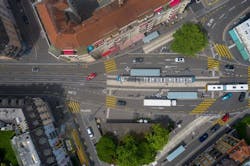Oct. 28, 2020—Earlier this month, Susanna Gotsch, director and industry analyst for CCC Information Services, presented a webinar detailing the impacts of COVID-19 on the automotive industry. Many in the industry believe that the coronavirus has not necessarily added any new hurdles, but rather forced the industry to address existing issues sooner rather than later.
Not a second was wasted during the one-hour presentation as topics ranged from the types of accidents happening to the complexity of repairs.
FenderBender identified 10 key takeaways that could influence your shop’s business—if they haven’t already.
-
Since the onset of the pandemic, there has been a decrease in the frequency of accidents. The cause of this, according to Gotsch, is due to the number of people working from home and not leaving their homes.
-
People will be less likely to take public transportation, even when they are able to return to work. Gotsch said this could lead to the re-design of city layouts, favoring pedestrians and cyclists.
-
Those who were considering buying a car before the pandemic are now more likely to follow through with the purchase.
“Car use may be less, but more people are interested in owning a car now than they were before the pandemic, especially in major metro areas like New York City,” said Gotsch.
-
Due to many people not leaving their houses, the flow of traffic has shifted throughout the year. Across the nation, normal rush hours saw a decrease in traffic, but throughout the day traffic remained at a constant level.
-
Despite various delays brought on by the pandemic, overall cycle times in shops have improved. The decline in the number of accidents has given technicians more time to complete repairs on schedule.
-
Telematics data has proven that tracking an individual’s driving patterns is the most accurate way to determine their insurance risk.
“Whether it’s coaching to improve behavior or to ensure that person is being priced properly for the risks they have, on a granular level, there is more data available,” Gotsch said.
-
As more vehicles become equipped with various technologies, accident types will change.
Gotsch said there will be a decline in low-speed crashes as well as high-speed crashes, and even the most common accidents, such as fender benders.
“These types of crashes may be avoided altogether with ADAS technology,” she said.
-
The auto industry, which is largely focused on electric vehicles, will begin to include large tech companies as they continue to make their own investments into autonomous vehicles. Gotsch said this is already being seen across rideshare corporations such as UberEats.
-
Vehicle repair will become an increasingly more complex task, and subsequently more expensive, as accident types change and technological components require repair, as opposed to a vehicle’s physical components.
“Adding to the complexities are ADAS calibrations, which include pre- and post-scans, dynamic versus static calibration, and the variety of road tests,” said Gotsch.
-
Gotsch warned that added complexity to the repair process can—and has—led to lower customer satisfaction.
“Whether or not a customer will refer you to others is largely based upon how well they are informed during the repair process,” she said. “Communication could help counter some of that frustration customers experience.
